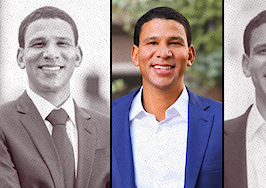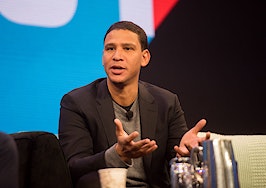Inman Connect New York delivers the perfect blend of outside-the-box thinkers, cutting-edge leaders, and hard-working, successful agents. Join us Jan. 24-26 for crucial content, education, and networking opportunities to help you thrive in today’s changing market. Register here.
Much of Robert Reffkin’s early life was based on hope.
His mother, Ruth, was forced to raise Reffkin alone after his father left and her family disowned her for having a Black son. To make ends meet, Ruth juggled a number of jobs including a position at the Jewish Community Center of the Greater East Bay, a brief stint as an insurance salesperson and then a difficult career as a real estate agent.
“I remember her going to these big houses, when I was just a young person, and someone in there would make her feel less than,” Reffkin said during his Compass REtreat keynote on Wednesday. “I remember her coming home in tears because there was a check that she was really counting on that didn’t come through.”
Reffkin, then a 15-year-old self-professed slacker, said his mother’s struggles lit a fire underneath him to do better. And for Reffkin, better was getting into Columbia University in New York City — a tall task for a kid who often chose DJing over schoolwork and had the grades to prove it.
But once again, Reffkin said, his mother’s hope pushed them to leave Berkeley for New York City and hatch a wild plan to get into Columbia University.
“She said, ‘Okay, here’s what we’re going to do. We’re going to go out to New York,'” he said. “I was a DJ at the time. [My mom said] ‘Give the admissions officer your business card and then you’ll fax all the information about your DJ business. You’ll write a handwritten note.’ We applied early and guess what? We got in.”
That sense of hope pushed Reffkin through college, and his early years at McKinsey, Lazard and Goldman Sachs. It then carried him to co-founding Urban Compass — now Compass — in 2012. It slingshot him into the real estate stratosphere with venture capitalist firms throwing hundreds of millions of dollars behind his company and vision.
However, Reffkin learned hope wouldn’t be enough to get him through an ill-timed initial public offering or the sudden shift into a perilous real estate market.
“That was the only time in my life where I had no hope,” he said of the days leading up to Compass’ IPO. “That was my lowest low.”

Ruth and Robert Reffkin at the Compass REtreat in Atlanta.
Reffkin said he was riding high during the week leading up to the IPO as he crushed investor presentations, also called a roadshow, and drummed up a groundswell of support. Compass was poised to become one of the highest-valued real estate companies ever with a $10 billion valuation based on an initial offering of $23 to $26 per share.
Then, a day before going live on the New York Stock Exchange, Compass cut its offering, a move that stoked rumors about how the roadshow actually went.
Although Reffkin put on a brave face on IPO day — “The goal was never a valuation [and] the goal was never a price,” he said on Bloomberg mere hours after ringing the opening bell — the true story was that Reffkin had considered pulling the IPO and spent the morning of the bell ringing crying on his shower floor.
“I meet with an investor, one of the best in the world, who just said a few months before they wanted to invest in our IPO,” he said. “He says, ‘Robert, I’m really sorry but something is happening right now. You’re gonna read about it in the press. It is a global event in the investment world, one of the largest companies [Archegos] that invest in companies just like you, fast-growing technology-powered businesses, is going bankrupt and they’re selling all their investments in 20 to 30 percent off in block trades. I’m sorry, I have to go.”
Reffkin said an advisor gave him two choices — wait to go public in 2022 or put all of your family’s money on the line and forge forward.
“I call my wife I say, ‘Honey, I know what we have to do. We just sold everything as a family and invested in IPO. There are 30,000 people that have put their blood, sweat and tears into this company. They have invested their own money in this company. We need to go all in,'” she said. “And so we did. She said yes. The next day was better. Because of the commitment I made.”
With his family’s full net worth now wrapped up in Compass, Reffkin said the stakes were higher than ever. Although he felt a temporary high from securing a “a top 100 IPO in the history of the United States,” the weight of possible failure and the words of doubters had him in tears once again. “I cried so hard that I couldn’t stand up. My legs were shivering. I tried as hard as I could, but I couldn’t stand up. I cried so loud, that my wife heard me two rooms away with earplugs in,” he said.
Once again, his mother’s journey came to mind and gave him the strength to plow through the first year as the leader of a public company. As he dealt with a paltry stock market performance and increasing scrutiny about Compass’ profitability, Reffkin said he kept his eye on a worsening global financial outlook that was poised to bring the industry to its knees.
“What I soon realized is that the Fed will be raising rates to such a level that companies would lose revenue. And people would lose jobs. That was the goal. The feds mandate is not jobs. It’s not company revenue is not the economy is not the stock market. It is 2 percent inflation period,” he said. “Everyone else is collateral damage.”
“Now we are an optimistic people as entrepreneurs. We like to believe things are always gonna get better, but there was a moment in June where I realized that hope is not a strategy,” he added. “You need to plan for the worst and hope for the best. An investor calls me and says Robert, ‘I hope you’re able to make the hard decision.'”
Those hard decisions have played out in the headlines, with Compass cutting 10 percent of its full-time workforce in June and ditching stock and financial incentives for new agents in early August. The company also let go of Chief Technology Officer Joseph Sirosh on Aug. 25 before cutting its 1,500 tech staff in half a few days later.
“We’ve all worked way too hard to depend on luck. I’m gonna make the hard decisions. If the real estate market goes down 30 percent, our expenses go down as well. I see all the agents bringing their expenses down. They should be more concerned if I don’t do anything,” he said. “So I made the hard decision. It was a heartbreaking one. But it was the right one.”
“Our technology team as an example went from 1,500 people to 700. But here’s where we are now,” he added. “Seven hundred people is still likely larger than every other traditional brokerage firm’s technology combined. It’s larger than we were just two years ago.”
Reffkin said more difficult decisions are likely on the way, but he’s still optimistic about Compass’ future.
“It’s like when I ran 50 marathons, one in each US state to raise a million dollars for nonprofits. One through 10 are amazing. Then 11 through 25, we’re halfway there,” he said in reference to meeting his personal goal of running 50 marathons. “I gotta tell you, 26 to 40 is a long, boring haul. There’s no excitement. I think the IPO was marathon 25, and I think right now, we’re around marathon 30.”
“Then you have the 30s. But then when you get to 40, things start getting really good and 50 is euphoric. We will have that moment together and I will be with you every step of the way,” he added. “And here is what that moment is going to feel like we will have delivered on the North Star, anything an agent needs Compass provides, we will have realized the promise of technology. It’ll be Apple easy and Google fast.”
He ended, “Our stock will go from two to 20 and well beyond. Many companies have gotten to 20 —Why not us? The book will be how a group of 30,000 entrepreneurs banded together to improve in industry and where will we be located? Of course, all the major cities in the US but not just there. We will be in London, Hong Kong, Singapore, Dubai, and Sao Paulo.”
“I promise you on our 20th anniversary, I will be on this stage still working for you. Yes, we will have a little more gray hair. Few more wrinkles. But we will have a lot more pride in the company that we have built together the future of real estate.”













